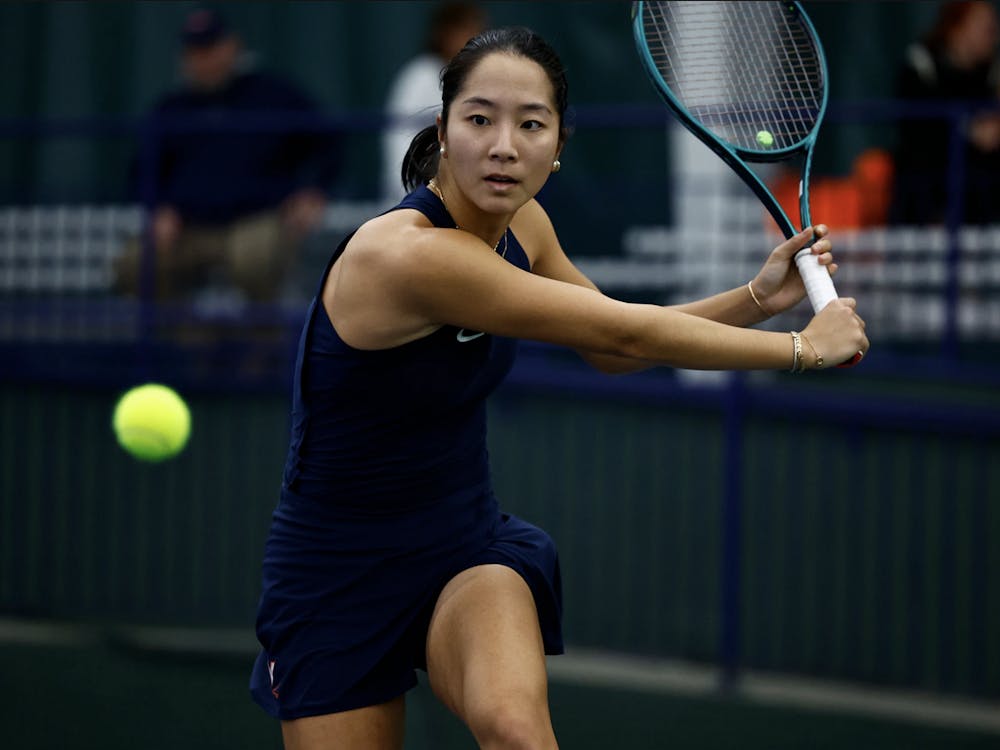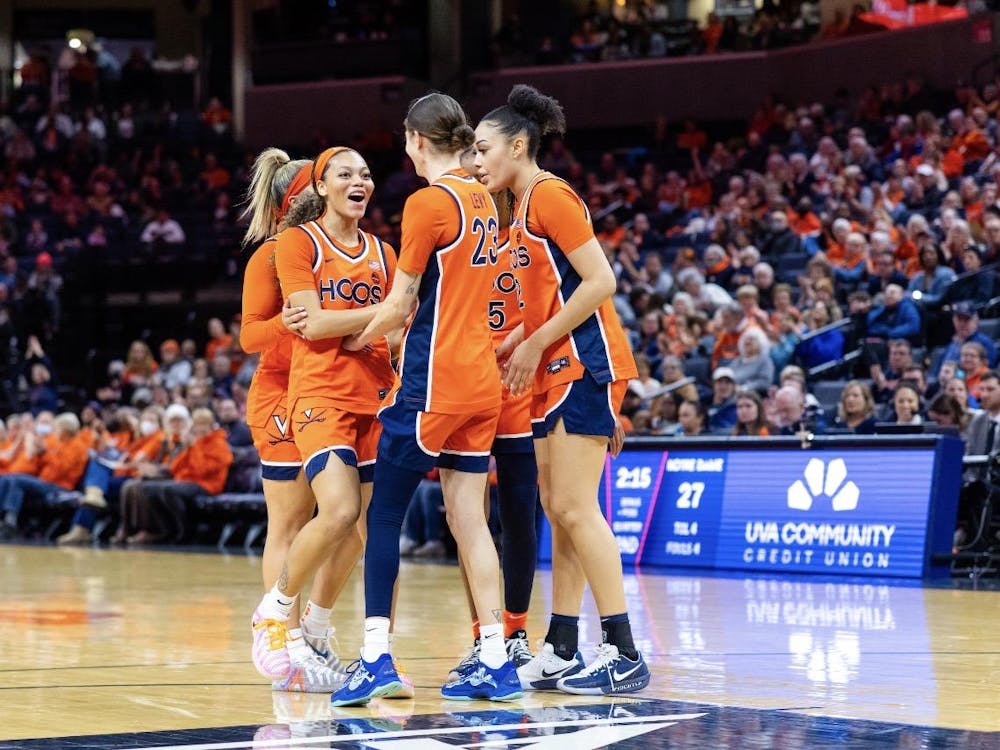Jason Kidd attended the University of California, Berkeley for two years, which sits one spot ahead of the University of Virginia in the U.S. News and World Report's rankings of the best public colleges and universities in the country.
That's my connection between this column and Virginia.
Why write about Jason Kidd? It's pretty rare that you get the chance to meet your athletic idol. It's even rarer that you get that chance while you hold a columnist position at a college newspaper.
But I just happened to get lucky - I met Kidd a week ago, when the Mavericks played the Wizards - and I'm taking advantage of it. So shoot me.
(Disclaimer: Kidd hit his ex-wife on several occasions, which naturally I do not condone. Note that the key term is "athletic idol.")
But the reason for which Kidd is my athletic idol is worth reading. He is the definition of the true point guard. There's a reason why Kidd started on the 2008 Olympic team instead of Deron Williams and Chris Paul. There's a reason that Mavs teammate Jason Terry said the Mavs were Jason Kidd's team - not Dirk Nowitzki's - just a year after he arrived.
I am tired of hearing about how Kidd is "on the decline." Is he past his prime? Sure he is - his points and rebounds are way down from the pinnacle of his career, though it's worth pointing out that his assists and minutes are not, and that his turnovers have never been lower. He will likely never win another NBA All-Defense award, which he won nine times during his career.
But "on the decline" makes him sound like he's withering away, limping into retirement on his surgically repaired knee. And that is just not the case. "J-Kidd" is still one of the best point guards in the game. Case in point are his assists, in which he ranks fifth in the league (9.2 per game). But the numbers aren't the half of it.
In explaining why Kidd's 9.2 assists per game are particularly impressive, I first have to slam him a bit. He's not much of a scorer. Though he improved his jumper late in his career, he'll only take it if left open. Additionally, he's not a threat to shoot off the dribble, and he penetrates to pass, not to shoot. You won't hear teams talking about "stopping" Kidd. Disrupt, pressure, attack, sure, but not "stop" in the way you would talk about a scorer.
That he does not make a living as a scorer, however, makes his assists all the more unbelievable. For example, take LeBron James - seventh in the NBA with 7.8 assists per game. He also leads the league in scoring, with 29.9 points per game, and ranks second on his team in total rebounds with 7.2 per game. He's the best player in the league, and the numbers show it. Kidd even admitted that if there's one player who could average a triple-double for a season, James is "the only guy that could do it." And that's saying a lot coming from Kidd, who is third all-time in career triple-doubles.
But, let's isolate James' assists for a moment. When you're a dominant scorer like James, assists come easily - just find the open man. He gets double-teamed, and defenses over-help. The guy guarding Delonte West is half guarding West, and half worrying about James. Teams have to respect James so much, that most of the passes he makes are potential assists.
Kidd, on the other hand, doesn't have that luxury - he earns his assists. Sure, he has the benefit of some shooters, like Nowitzki and Terry. But they need a catalyst, someone who can get them the ball on time every time. And Kidd does that and more. For every one dazzling assist collected by James, I would venture to say that Kidd has three assists that are at least as high in difficulty. When Kidd has the ball, the entire arena knows he's not going to shoot, and he still gets close to double-digit assists every night.
"My job is to get [the other] guys going," Kidd told me. "For me, in my career right now, that's my job, is to find the open guy, especially when you've got offensive weapons like we do here."
But even the assists don't tell the whole story. Everyone who has ever coached or played with Kidd has called him the master of the intangibles - the little things. The little things, for example, represent the only reason that Will Sherrill gets significant minutes for Virginia, despite the fact that he is nearly always the least talented player on the floor.
So what are the little things for Kidd? One is anticipation - although he isn't as quick as he used to be, Kidd still gets 1.68 steals per game while not taking needless gambles defensively. He is one of the best rebounding point guards of all-time (6.7 per game for his career), and not because of sheer athleticism - he just has a knack for knowing where the ball is going to come off the rim, and unlike many other guards in the league, he is not shy about going and getting it.
There are his leadership skills too - Mavs' coach Rick Carlisle has frequently said Kidd directs the Mavs on both ends. There are the so-called routine plays that he makes that others don't. Kidd is perhaps the best in the game in a stat that isn't taken, what I think of as hockey assists - a pass that leads to a pass that leads to a bucket. His decisions in transition are as good as they come in the league; he might not get a basket or an assist, but you often can say, "Man, that bucket wouldn't have happened if it weren't for J-Kidd."
Here's what Carlisle thinks about Kidd:
"He's got a real pulse on the team, and a good hand on the controls," Carlisle said. "It's really key. He does a lot of directing of things - defensively, too - and he gives the rest of the guys a lot of confidence."
If he's such a great leader, one might naturally ask, then why has he never won a championship? Just look at the teams with which he's played. In his prime with the New Jersey Nets, Kidd played with the likes of Keith Van Horn, Kerry Kittles, Kenyon Martin, Todd MacCulloch, Lucious Harris, and a young Richard Jefferson, and made the Finals twice, in 2002 and 2003. The second time, the Nets took Tim Duncan's Spurs to six games before falling. As ESPN.com columnist Bill Simmons writes in his Book of Basketball, Kidd "turned chicken shit into chicken salad in his first two years" with the Nets. After that, he teamed up with Vince Carter, and in doing so helped fans compare and contrast one of the most team-first players of all time with one of the most me-first players of all time. Not exactly a winning combination.
Kevin Garnett needed teammates like Paul Pierce and Ray Allen to win a championship, and Kobe Bryant couldn't do it without Shaquille O'Neal and Pau Gasol. Only now, as Kidd is beginning to fade does he have players like Nowitzki and Shawn Marion to help him - and, by the way, Dallas is now third in the Western Conference. And, it's worth mentioning that, in his 15-plus-year career, Kidd has failed to make the playoffs only once: his rookie season. And, in that year, he won co-Rookie of the Year along with Grant Hill. So don't tell me that the guy doesn't know how to win.
Is Jason Kidd the best player in the league? Not even close - in fact, he probably never was. (Even in Kidd's prime, I'd give the nod to Duncan.) He once was the best point guard in the league, but now he's not even that.
But, if you asked guys around the league, "With whom would you most like to play?" I'd be willing to bet Kidd is in the top five. And, in my book, that's the kind of player worth calling your idol.






